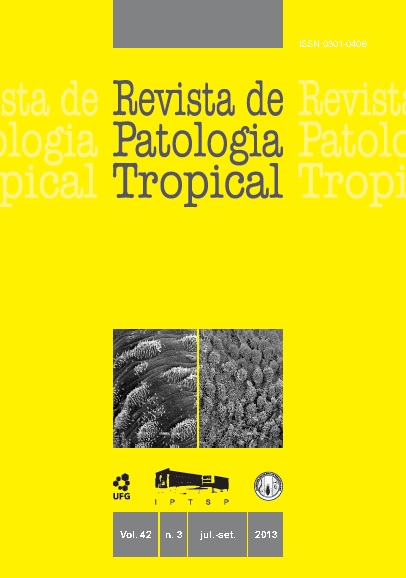MOLECULAR ANALYSIS OF Mycobacterium tuberculosis ISOLATED FROM PATIENTS IN GOIÂNIA, BRAZIL, USING RFLP-IS6110 AND 15 loci MIRU-VNTR TECHNIQUES
DOI:
https://doi.org/10.5216/rpt.v42i3.26925Keywords:
Molecular epidemiology, Tuberculosis, Genotyping, TransmissionAbstract
Currently, tuberculosis control is dependent on several factors, such as rapid diagnosis, appropriate therapy and measures to prevent future transmission. Thus, the characterization of strains of Mycobacterium tuberculosis by molecular typing using RFLP-IS6110, provides a major contribution, and has been widely used in genotyping studies in order to trace transmission pathways. However, due to the complexities of the technique and data interpretation, other techniques have been proposed. Among them, the study of the variable number of repeat units (MIRU-VNTR) has been indicated as a new standard method. This study aimed to apply and compare the RFLP-IS6110 and 15 loci MIRU-VNTR techniques for the analysis of isolates from tuberculosis patients treated in Goiânia, Brazil, in order to establish possible molecular epidemiological links between cases of the disease, and also to compare the results found by both techniques against the wider situation in Brazil. The results showed that 15 loci MIRU-VNTR discriminated between the isolates better than the RFLP-IS6110. No epidemiological link was observed among the patients studied. The results validate the use of the 15 loci MIRU-VNTR technique for molecular typing of M. tuberculosis, as it showed greater discriminatory power with good efficiency to genetically characterize the isolates in Goiânia, Goiás. This can be used in epidemiological studies alone or in conjunction with other molecular techniques.Downloads
Downloads
How to Cite
Issue
Section
License
The manuscript submission must be accompanied by a letter signed by all authors stating the full name and email address, confirming that the material has not been published or is under consideration for publication elsewhere, and agreeing to transfer copyright in all media and formats for Journal of Tropical Pathology. The authors will not be paid for published articles. They are solely responsible for the content of those articles, even if the Editor holds the right to adjust them to the norms of the journal.
The reviewers will not be paid for the peer review process.

